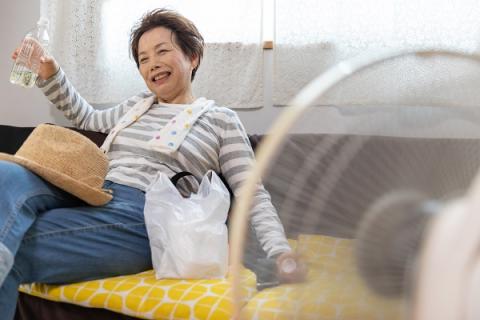Helping Older Adults in a Heat Wave
Understanding how heat affects older adults
Understanding why older adults are more vulnerable during these extreme weather events and knowing how to help can make a significant difference in an older person’s health during a heatwave. Studies have shown that even healthy older adults can struggle to know when they are dehydrated or too hot. But cognitive decline, certain medications, or other health conditions can cause changes to the way our bodies naturally regulate temperature.
Older adults often have a reduced ability to sweat, which is a natural cooling mechanism. Additionally, they may have a decreased sense of thirst, leading to inadequate hydration. Limited mobility can make it challenging for older adults to move to cooler places or access resources like air conditioning. Those living alone may not have immediate assistance to deal with heat-related issues.
Another factor is that the temperature at which an older person experiences adverse effects from hot weather is lower than the National Weather Service’s definition of a heat wave. Researchers from Harvard have learned that temperatures need only to rise above a region’s normal range to affect hydration, sleep, and cognition.
Harvard researcher Francesca Domenici says that science and medicine have made impressive advancements in understanding how a warming climate threatens human bodies.
“So many heat-related hospitalizations and deaths are preventable,” she says.
And given the growing older population, intervention by institutions and policymakers may be necessary. But individuals have a role to play in protecting our loved ones and members of our communities. Here are some recommendations:
- Stay hydrated: Ensure older adults drink plenty of water throughout the day. Offer them a variety of hydrating beverages like water, fruit juices, and herbal teas. Avoid caffeine and alcohol as these can lead to dehydration.
- Keep the environment cool: Make sure their living space is cool. Use fans, air conditioning, or portable coolers. If they don’t have air conditioning, consider taking them to public places like shopping malls or community centers during peak heat hours.
- Dress appropriately: Encourage wearing light, loose-fitting clothing made from breathable fabrics like cotton. Light-colored clothing can also help reflect heat.
- Plan activities wisely: Limit outdoor activities during the hottest parts of the day, usually between 10 a.m. and 4 p.m. Encourage activities during cooler hours, such as early morning or late evening.
- Monitor health regularly: Check on older adults frequently, either in person or via phone calls. Look for signs of heat exhaustion or heatstroke, such as heavy sweating, weakness, dizziness, nausea, rapid heartbeat, or confusion. Seek medical help if any of these symptoms are present.
- Create a support network: Develop a support system involving neighbors, friends, and local community services. This network can help ensure someone is always available to assist and check on the older adult during extreme heat conditions.
- Educate and communicate: Make sure they understand the importance of staying cool and hydrated. Clear communication about the dangers of heat and the steps to take can empower them to take proactive measures.
- Prepare for emergencies: Have a plan in place for power outages or other emergencies. Keep emergency contacts, a list of medications, and important health information readily accessible.
Heatwaves pose a significant threat to older adults, but with the right knowledge and proactive measures, caregivers and loved ones can help mitigate these risks. By staying vigilant, maintaining regular communication, and ensuring a cool and hydrated environment, we can support our older loved ones in staying safe and healthy during the hot summer months.
